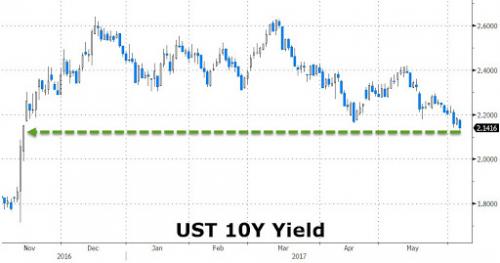Confirming what we reported two weeks ago, when we said that based on Treasury custody holdings at the NY Fed “foreign central banks have been quietly scooping up US treasurys”, Bloomberg reported that China is prepared to increase its holdings of U.S. Treasuries “as officials judge the assets are becoming more attractive than other sovereign debt and as the yuan stabilizes.”
Citing source, Bloomberg adds that Chinese policy makers expect that U.S. government debt will be more attractive compared with other countries’ assets, and again confirming what we showed on May 25, adds that China has recently stopped reducing its holdings of U.S. bonds.
While the move is a reversal to China’s liquidation of US paper in 2016, when reduced its ownership of Treasuries by the most on record as it sought to defend a weakening yuan, it merely confirms recent trends observed in both the Treasury’s TIC statement and custody holdings data. Bloomberg confirms as much, reporting that “China has since changed strategy, adding to its holdings in the two months through March.”
Following the Bloomberg report, the 10Y Treasury yield dropped to a new YTD low of 2.136%, while the 5Y has slid to 2017 lows of 1.6909%.

For those who missed it, here are excerpts from our May 25 report titled “foreign central banks have been quietly scooping up US treasurys”, which previewed all that Bloomberg just reported.
As the latest custody data from the Fed reveals, in 2017, debt held at the Fed on behalf of foreign central banks has jumped by $61.2 billion to $2.922 trillion, the highest level since June 2016.

One of the biggest buyers has, perhaps surprisingly, been China – the second largest foreign holder of US paper after Japan – which after selling $188 billion in Treasurys in 2016 has bought $29 billion YTD according to the latest TIC data. A main driver behind this mini buying spree is that the relentless Chinese reserve outflow, which started in late 2014 and continued for over 2 years, has moderated after the PBOC erected an unprecedented firewall to contain capital inside the country, and which has removed the pressure on the PBOC to liquidate US-denominated assets to offset the capital outflows.

